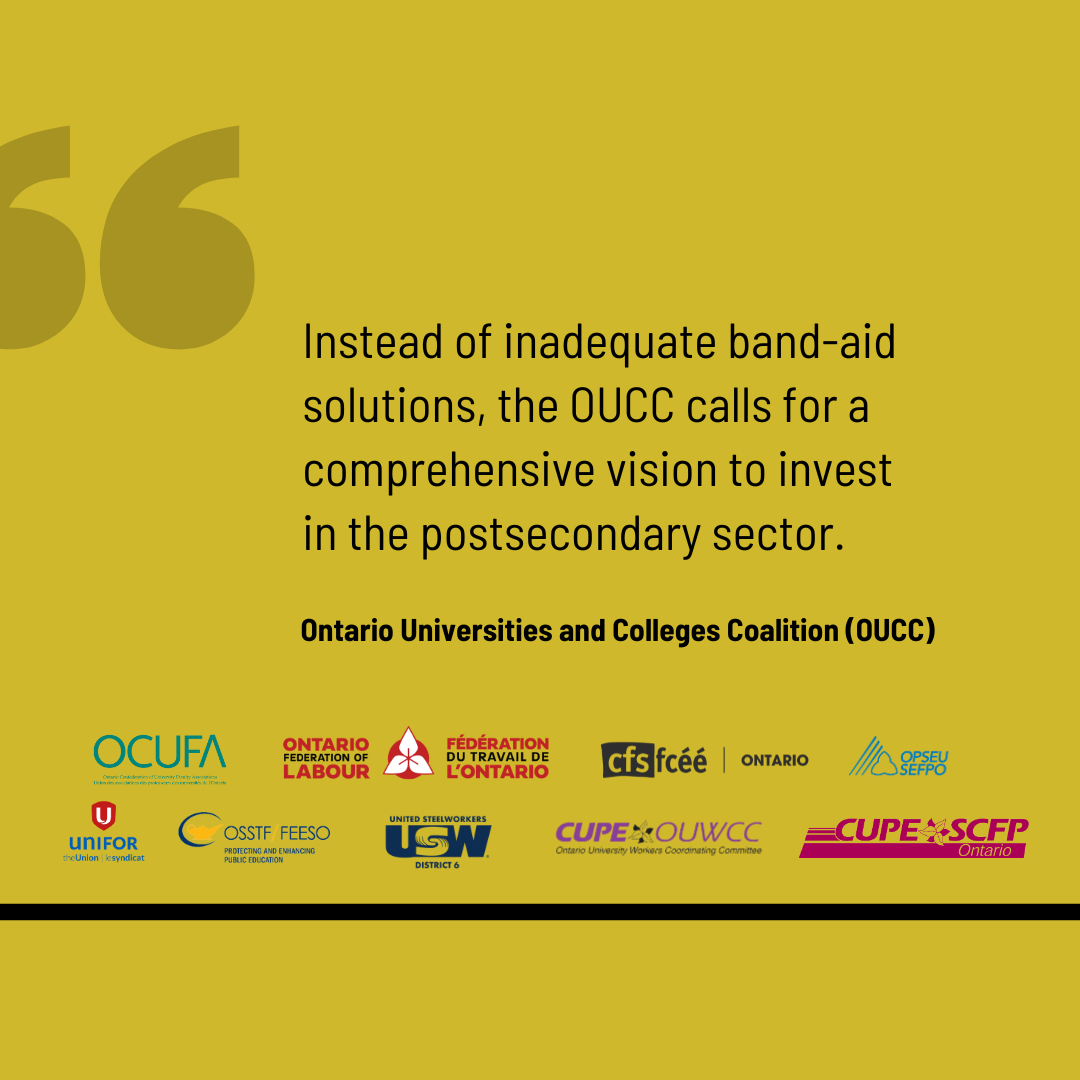Government-announced PSE funding is inadequate and falls short of what is needed for a robust, sustainable post-secondary education sector

The Ontario University and Colleges Coalition (OUCC), which represents over 435,000 faculty, staff, and students from every public postsecondary institution in Ontario, has been ringing the alarm on the post-secondary education sector’s underfunding crisis, which has been in the making for over a decade through consecutive austerity budgets, privatization, and burdening students and their families with financing the sector. The issue of underfunding is well documented by labour unions and associations in the sector, confirmed by multiple reports from the Auditor General of Ontario, and also echoed by the government’s own Blue-Ribbon panel.
Minister Jill Dunlop announced on Feb 26, 2024, that the government would provide $1.3 billion over three years to “stabilize” the sector, but the reality is that this amount will fall far short of addressing existing underfunding in the sector, let alone begin to deal with the revenue shortage caused by new limits to international student enrollment.
For Ontario’s universities to reach the Canadian average for per-domestic student funding, Ontario would need to increase its total university funding by an additional $2.53 billion for the first year. Ontario’s colleges are also vastly underfunded compared to the national average. For Ontario’s colleges to reach the Canadian average for per-student funding, Ontario would need to increase funding by an estimated $2 billion for the first year. For each year that our provincial government continues to fail students and staff in the sector by not providing this funding, this gap between Ontario and the rest of the country would widen even further.
There is no evidentiary basis for the government’s use of the framework of “efficiencies”; we recognize it as code for privatization schemes that shovel public dollars into private profit margins. This is a deliberate policy choice and will harm the sector. We are concerned the $15 million announced by Minister Dunlop may be an investment in for-profit, third-party firms to conduct reviews for data that is already available. Rather than being driven by sector needs, this announcement seems to be motivated by a need for political cover and to pave the way for further privatization in the sector.
Instead of inadequate band-aid solutions, the OUCC calls for a comprehensive vision to invest in the postsecondary sector.
Address high tuition costs by committing to a substantial public funding strategy.
Scrap performance-based funding and increase per-student provincial funding to match the needs of students in the sector by committing to inclusive, accessible, and high-quality learning, training, as well as research in Ontario.
Invest in student financial assistance by funding OSAP and reversing the damage from the $671 million cut from 2019.
In consultation with labour and student groups, improve student-educator ratios and public student services including meaningful mental health services, housing, food, health & safety systems, and other support services.
Develop a capital infrastructure public investment plan to address the deferred maintenance costs in the sector estimated to be $6.4 billion as of 2019.
Prevent further privatization of educational and support services.
If equipped to do so, postsecondary institutions can be thriving, vital economic engines that boost Ontario’s communities by providing high-quality experiences to students and researchers, as well as fair compensation and stable working conditions for all staff.
On behalf of the OUCC:
Mitra Yakubi, Chairperson, CFS-Ontario
Fred Hahn, President, CUPE Ontario
Nigmendra Narain, President, OCUFA
Jenny Ahn, Executive Director, OCUFA
Laura Walton, President, OFL
JP Hornick, President, OPSEU/SEFPO
Christine Kelsey, Chair, OPSEU/SEFPO College Support Full-Time Divisional Executive
Sara McArthur Timofejew, Chair, OPSEU/SEFPO College Support Part-Time Divisional Executive
Jonathan Singer, Chair, OPSEU/SEFPO College Faculty Divisional Executive
Kella Loschiavo, Chair, OPSEU/SEFPO Universities Sector Executive
Karen Littlewood, President, OSSTF
David Simao, Sector Chair, OUWCC
Samia Hashi, Ontario Regional Director, Unifor
Myles Sullivan, Director, USW District 6

